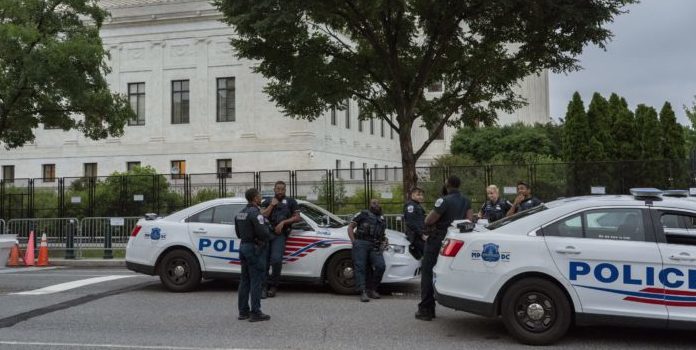(Tony Sifert, Headline USA) Supreme Court Marshal Gail Curley has sent a letter to the Republican governors of Maryland and Virginia requesting that they enforce laws prohibiting protests outside the private homes of the Supreme Court’s conservative justices.
In her letter to Maryland Gov. Larry Hogan, Curley pointed to both Maryland state law and Montgomery County law that could be enforced against the increasingly agitated protestors, reported Fox News.
“I would respectfully request that you direct the Maryland State Police to enforce Maryland and Montgomery County laws that squarely prohibit picketing at the homes of Supreme Court Justices who reside in Maryland,” Curley concluded.
The Marshal’s request came nearly two months after governors Hogan and Virginia’s Glenn Youngkin sent a letter to Attorney General Merrick Garland, pointing to federal code that prohibits the protests, and calling on the DOJ to use federal resources to protect members of the high court.
Today, @GovernorVA and I sent a letter to Attorney General Merrick Garland calling on the Department of Justice to provide adequate resources to keep the Supreme Court justices and their families safe amid ongoing protests at their homes. pic.twitter.com/6D0bMGSp3q
— Governor Larry Hogan (@GovLarryHogan) May 11, 2022
“Today, we together ask that the Department of Justice . . . provide appropriate resources to safeguard the Justices and enforce the law as it is written,” Youngkin and Hogan wrote.
Hogan’s spokesman responded to the Marshal’s request by claiming that the governor is reluctant to enforce the relevant statutes because their constitutionality is apparently up for debate.
“Had the marshal taken time to explore the matter, she would have learned that the constitutionality of the Maryland statute she cited has been questioned by the state Attorney General’s office,” spokesman Michael Ricci said in a statement.
A spokesman for Youngkin claimed that the governor’s attempts to provide extra protection to the justices had been “rebuffed” by Jeffrey McKay, chairman of the Fairfax County Board of Supervisors.
In a message to the Associated Press, McKay also suggested that his hands were tied by the alleged unconstitutionality of the statutes.
“The law cited in the letter is a likely violation of the First Amendment, and a previous court case refused to enforce it,” McKay said.
“As long as individuals are assembling on public property and not blocking access to private residences, they are permitted to be there.”

